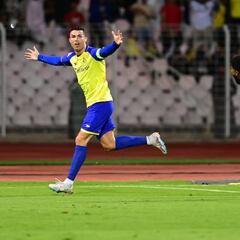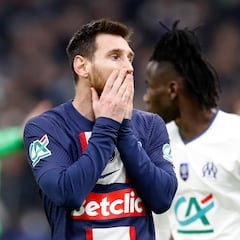Chelsea’s João Félix speaks to AS: Premier League, debut red card, Atlético future, Simeone...
A month after joining on loan from Atlético, Portugal’s João Félix sat down with AS to discuss how he’s settling in at Premier League club Chelsea.
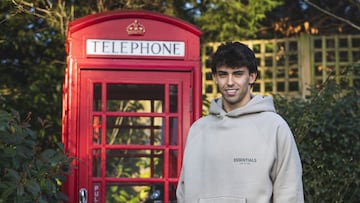
The interview was scheduled for 3pm at João Félix’s house, but he’s running a few minutes late. He got held up at Chelsea’s training ground and couldn’t make it back in time. In the meantime, however, he has made sure that we’ve been let in and can get ourselves set up. Just when we’re ready to get started, the Portugal forward walks through the door. After posing for a few photos in his huge garden, he lets us know that he doesn’t have a lot of time. “I’ve got a team dinner,” he explains, “and before that I have to go and do some fitness work with Rui Pires, my personal trainer.”
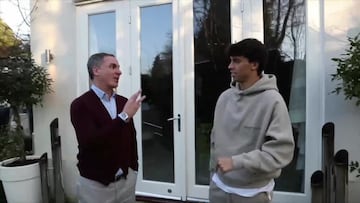
Let’s get straight to it then. How’s life in London?
It’s really good. Just like Madrid, it’s a really nice place to live. It’s a great city. Chelsea’s training ground is terrific, too. It’s close to where I live. To be honest, my daily life here is very similar to what it was like in Madrid.
Take us inside Chelsea - what’s it like as a club?
It’s a top club, as we all know. It’s really, really well set up; it has everything. There are a lot of people surrounding the team who make sure that everything’s going well, and that’s really helpful. It’s a very well structured club.
Is it noticeable that Chelsea are one of England’s richest clubs?
Yeah, it’s very noticeable. Because of the signings that are brought in, because of everything. It’s also a club that’s changing on the inside; they’re bringing in new people and are in a process of change. It’s clear that this is a club with a lot of money.
Have you settled in well in the dressing room?
Yes, it’s been very easy. It’s been a different experience, because when I joined Atlético Madrid, I was a lot younger. I was 19. Now I’m 23, and I’ve settled in right from the off. I knew some of my team-mates already, and that made things easier.
Have your team-mates made you do an initiation?
Not yet. I think I’m going to have to sing a song at some point, but I haven’t had to do anything yet. There are a number of Spanish players in the dressing room: [César] Azpilicueta, Kepa [Arrizabalaga] and [Marc] Cucurella.
Have they helped you to settle in?
Yeah, I get on really well with them. They were the first lads I started to speak to, because they’re Spanish and I’ve been playing in Spain... because of all those types of things. They’re really good lads.
In the January, Chelsea also signed Enzo Fernández, who is a former Benfica player like you. What are your thoughts on his signing? And how well has he slotted into the dressing room?
He’s a really good lad. He’s integrated into the group really well. He arrived two days before a game and started playing from the off. He performed really well. He’s a terrific player.
Are you surprised that Chelsea paid €121 million for him?
No, it’s more and more common for clubs to pay sums like that. Football has changed and it’s going to be normal to see players bought for 80, 90, 100, 110 million… He’s worth that kind of money because he’s a young lad, he’s a very good player and there’s so much scope for him to get better and better. He’s most likely going to be one of the best central midfielders in Europe.
Have you had the chance to sit down with Chelsea boss Graham Potter?
On one of my first days here, he called me into his dressing room. We talked about the kind of football he wants to play, and how he sees me fitting into his team. He explained how the team plays. I was really pleased that we had that face-to-face chat. You can tell he’s a really good guy and a top coach.
What is his playing style?
He likes to have the ball, control the game and play attacking football. He likes to defend too when need be, of course, but he likes to control the game and play on the front foot. I like that.
On your debut against Fulham, you were playing very well but suddenly, on the hour mark, you were sent off. What went through your mind when that happened?
I kept calm. I was playing well, and that’s football. These things happen. It’s just like missing a great chance to score or missing a penalty. I got a red card, but these things happen in football. We have to be able to deal with that. I didn’t let it get me down. These are things that we have to take in our stride. Getting a red card on your debut is obviously that bit tougher to take, but I kept calm. I was doing well and I’m confident in my ability.
On Saturday, you can finally return to action after missing a month through suspension. Are you absolutely champing at the bit?
Yeah, I’ve been waiting for a month. The team has only played three games in that time - the number of games I was banned for - so on Saturday I can get back out there.
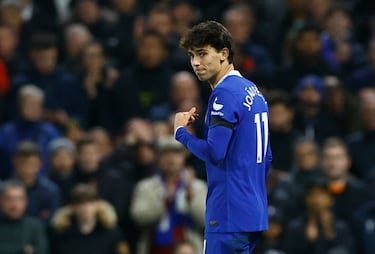
What differences have you seen between the football played in the Premier League and LaLiga?
In the Premier League, it’s a brand of football that’s all about duels, individual match-ups; it’s less tactical. It’s end-to-end stuff here and the scoring chances come thick and fast. I like it.
Would you like to stay at Chelsea next season?
They don’t have a purchase option, so they’d have to reach an agreement with Atlético. I’ve only been here for a few weeks or so, a month. I’m still getting to know my new surroundings. I really like it here, but it’s impossible to say what’ll happen in the future.
Why did you decide to leave Atlético in January?
I had been looking for a change of scene for a while, because it was difficult to get used to the way we played. I left because I had had enough of trying and not succeeding. I had to leave in January and I think it has been a good thing for Atlético and for me.
What is your opinion of Diego ‘Cholo’ Simeone as a coach?
Everyone knows him, everyone knows what he has won. He’s a terrific coach. He has a way of understanding and seeing the game that not every other coach shares. Some people like it, some people don’t. That depends on the individual. But it has been effective and that makes him a really good coach.
Would you have liked to be given more confidence by Simeone?
Confidence has to come from within the player, too. It didn’t to begin with, but by my third year I was always 100% confident. And it’s normal for a coach to have more confidence in some than others.
Simeone said that he understood why you got angry with him, but he’d make you a better player. Do you think he’s done that?
Yes. Yes, of course. Since my arrival at Atlético, I’ve become a better player. And that’s thanks to everyone: ‘Cholo’, [former] Portugal coach Fernando Santos, my Portugal and Atlético team-mates… The games I’ve played and haven’t played, too. Everything has helped me to grow as a player.
What has Simeone brought to your game?
I’ve always been a competitor, always wanted to win. What I’ve learned is to compete in a different way than I was used to. I’ve always wanted to win more than anyone, but at Atlético I learned to compete in a different way.
What is Simeone’s different way of competing?
Basically, it’s all about being able to dig in: you weather the storm, then get an opportunity to score and take it. That’s his way of competing. There’s nothing wrong with it, but it’s different to other coaches.
So you could say that Simeone taught you how to come out the other side when the going gets tough?
Yes, I guess so. That’s about right.
Do you think this will be Simeone’s last season as Atlético boss?
I don’t know. Every year, people say he’s going to leave, but he never does. So I don’t believe anything that’s said anymore. If he stays, great; if he leaves, I wish him all the very best. We’ll only know what’s going to happen in June.
Some months ago, you were asked who the best coach in the world was. You responded evasively, and that caused controversy. Have you had time to decide who you think the best coach is?
I can’t remember what I said, but it would be unfair of me to give an answer, because I’ve had a number of top coaches. I don’t think it’s fair to name just one. If I say ‘Cholo’, I get criticised for not saying Fernando Santos. And if I say Fernando Santos, I get criticised for not saying ‘Cholo’. There’d have been a fuss for certain, so it was better not to answer. But if you want a name, then maybe Bruno Lage, who was the coach who gave me my chance at Benfica. That way there’s no controversy.
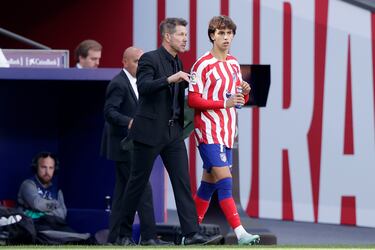
Are you watching Atlético’s games? There have been many changes to the squad…
Yes, I watch them when I can. It’s the same Atlético, a side that really digs in. I watched their game against Real Madrid. They were fantastic in the first half. After that, the second half wasn’t so good, but that’s something we’ve seen happen at Atlético over the years. Sometimes we’re playing really well, then we concede a silly or unlucky goal and the game changes completely, and so does everyone’s state of mind. I hope they have a good season. They had the chance to challenge for the Copa del Rey, but they’re out now, so it’s all about fighting hard in the league and qualifying for the Champions League.
Are you still in touch with any Atlético team-mates?
Yes, Felipe has left, but I’m still in touch with Reinildo and a few others.
Your form in the first half of the 2020/21 season was fantastic. Many viewed you as LaLiga’s most influential player at the time, alongside Lionel Messi. However, you then got injured and struggled after that. Apparently, this is because you played for several months despite still being injured. Is that true?
Yes, it affected my game, because I didn’t feel like myself out on the pitch. Despite that, I always tried to help the team. I knew it was a very important year. We were having a great season and were in pole position to win the league, so I just focused on trying to help the team right to the last. After the season was over, I had surgery and the pain stopped.
For how many games did you play through the pain?
From November or December. I got injured in the home game against Bayern Munich [on 1 December 2020]. After that.
And you played on like that until the end of the season?
Yeah. I didn’t know what injury I had, just that I was in pain. I did tests, but I didn’t know I’d fractured a bone. I only found that out at the end of the season, when I went to see a very well-known foot specialist.
So you spent six months playing with a broken bone in your foot?
Yeah, I had broken a bone and it was the same feeling as when you have a stone in your shoe, just that it was inside my foot.
What moment would you choose as your Atlético highlight?
That first half of the season when we won the league. Last year, before I got injured, was also very good. That’s what I’d go for.
What has prevented you from rediscovering that kind of form?
The injuries undermined my confidence and my sharpness, but other things also affected me. Now I’m older and more mature, and I don’t think I’m going to have the same ups and downs; I’m going to be more consistent.
Do you ever regret signing for Atlético?
No, I don’t regret it. It’s done me a lot of good to leave Portugal, develop as a player, experience new things, new players, new coaches… I don’t regret it, because it has helped me to grow.
If we went back to summer 2019, would you advise João Félix to sign for Atlético?
That summer, Atlético showed a lot of interest in me and that’s what made me sign for them. I really liked the three and a half years that I was there. There were good times, and others that weren’t so good. We don’t know if my time there is over or not. We’ll only know that come the summer. But I don’t regret signing for Atlético.
You could often be seen gesturing in frustration or anger at Atlético. What was that down to?
Well, that was because the goal wouldn’t come, or because the results weren’t going our way, or because I couldn’t get on the ball, or because I was spending a lot of time defending... But I needed to be able to deal with that and I think it’s something I’ve now improved on.
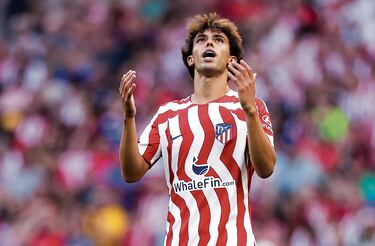
Did the €127m price tag place a lot of added pressure on your shoulders?
No, not at all. There was a lot of talk about my price tag, but I never gave it any thought. If that’s what they paid, that’s what they paid. I don’t spend every day thinking about how much I cost and thinking that I have to do this, or have to do that. I just have to do my job. If that’s what they paid, then great, but I’m not thinking about it.
Atlético CEO Miguel Ángel Gil Marín still has a lot of faith in you - to the point where he loaned you out, but refused to include a purchase option. How do you interpret that?
Unlike many other people, Miguel has always shown a lot of confidence in me, he’s always stuck his neck out for me. I have a good relationship with him. I’m grateful to him for letting me leave now, because I needed it. I wasn’t happy anymore. Miguel has always believed in me and I think he still does. He sees me as a player Atlético can pin their hopes on, but we’ll have to see…
In Spain, there’s been a lot of controversy surrounding Real Madrid’s Vinícius Júnior. Some say he’s provocative, others say he’s being targeted by defences. What’s your take on the issue?
I don’t understand the criticism that Vinícius gets. Maybe it’s because he’s better than others; because he sets off on dribbles that others aren’t capable of; because he produces moments of skill that others can’t do; because he’s quicker, scores goals, and supplies assists. He’s playing very well and it feels like everyone’s against him. I’m pals with him. I talk to him and I like the way he plays football. The dribbles he conjures up get people’s backs up, but that’s football. That’s his brand of play; a fun brand of play. I like it, and I don’t understand all the criticism.
What advice would you give Vinícius?
I’d tell him to keep doing what he’s doing, because he’s a lot of fun. I saw the other day that he was having a right battle with the Mallorca players. That’s great to see: sometimes Vini will win, sometimes the defenders will win. It’s sad to see that there’s racism against him; you can have a go at a player without resorting to that.
At one point, you were the most-fouled player in LaLiga. Do you think referees need to protect expressive, creative players?
When it’s a foul, the referee should blow the whistle and protect the player a bit, because defenders always go in harder on that type of player. Sometimes, the referees don’t protect you. Players with magic in their boots - players who dribble, conjure up moments of skill, do nutmegs and flick it over the defender’s head - they make the game good to watch. That’s my experience: I like to watch a game and see one of those players who gets me on the edge of my seat, who has me waiting to see if they do something different. Many people share my opinion. I think referees could protect players more. I’m not saying the referees in Spain are bad; I don’t have anything against them. Except [Jesús] Gil Manzano when he sent me off against Athletic Club [laughs].
That was the first red card of your career. What are your memories of the incident?
Afterwards, I watched back the gestures I made to him, telling him he was stupid. That was a clear yellow, but the first yellow he showed me shouldn’t have been a booking. [Athletic’s Unai Vencedor] pulls me back, I try to get away from him but don’t hit him, and I’m booked for that. The referee wouldn’t have been wrong to show me a straight red card for the gesture I made to him [for the second booking], though. Afterwards I spoke to him; these are just things that happen in football. I was very angry with him at the time, but in the next game I had with him things were fine, and it’s all water under the bridge now.
Is Gil Manzano the referee that has got you the most angry?
Yes, of the referees I’ve had, he’s the one that’s angered me the most. In that game, he really annoyed me [laughs].
Are you clear on when a handball in the box is a penalty?
I’m not totally clear, no. In my view, any handball in the area should be a penalty. That way, there wouldn’t be any arguments about whether or not it was intentional, or whether the player’s arm is close to their body or not. If the ball hits a defender’s hand, it’s a penalty. End of story.
Do you like VAR?
No, I don’t like it much. It has reduced the number of mistakes [referees] make in football, but football is a game of mistakes. Just as the players make mistakes, so too do referees sometimes. That’s football. Within a few years it’s going to be like basketball: time will get taken up [with video reviews], and they’ll limit how much time you’ve got to attack. Football is great the way it is, and I think it would be more exciting without VAR, because there’d be mistakes that create controversy.
What are your thoughts on Atlético youngster Pablo Barrios?
At the end of his first game for Atlético, I went up to him and told him: “Keep doing what you’re doing - playing on the front foot, without being afraid to take risks. Because you’re going to be a very good player.”
Do you feel like Portugal spurned a good chance to win the World Cup at Qatar 2022?
Yes, a really big one. We were left with the feeling that we had had a huge opportunity to achieve something really special. We had put in some really good performances and were playing well, but that’s football. It isn’t always fair. All credit to Morocco; they had a great World Cup.
What were you lacking as a squad?
As a squad, we weren’t lacking anything. It’s one of the best I’ve ever been in. The group we had at this World Cup was terrific. We all got on really well, we all talked to each other, nobody brought the mood down… We needed a little bit more luck. There were clear penalties in that game that weren’t given. That’s bad luck.
What was the squad’s reaction to Cristiano Ronaldo being benched against Switzerland? And how did he react to it?
We were surprised, because seeing Cristiano on the bench is not something you’re used to. But it was the gaffer’s decision: he’s the one who calls the shots. Cristiano reacted really well, because we were all pulling in the same direction and creating positive vibes. His reaction was really good for the rest of us, because he looked to give the team confidence and make it clear that we were all in this together. It was really good for us and he just kept on being a real help in every way.
Will he continue playing for Portugal?
Yes, I’m sure he will.
Will he still be there for the European Championship next year?
I think so, but you’d have to ask him.
Were you surprised that he moved to Saudi Arabia?
No, because there was nothing left for him to win in Europe. He’s written his name into the history books and now he’s going to write his name into the history books in Saudi Arabia. I wish him all the best.
What’s your opinion on the appointment of Roberto Martínez as Portugal’s new head coach?
Related stories
He did a great job with Belgium. They were top of the world rankings for a long time. I like his style of play. I talked to [Atlético players Yannick] Carrasco and [Axel] Witsel, and they spoke very highly of him. With the players he has at his disposal, I think he’s going to do a really good job.
Finally, will we see you and Simeone back together at Atlético next season?
I don’t know what the future holds for me. I don’t know what ‘Cholo’ is going to do, either. As I say, we’ll have to wait until June.
